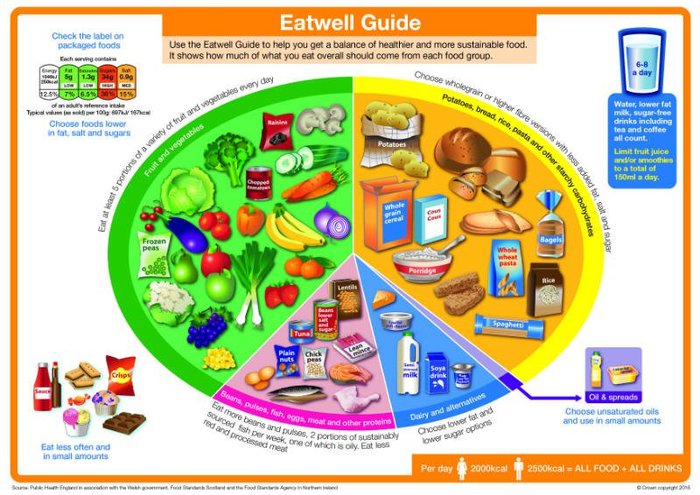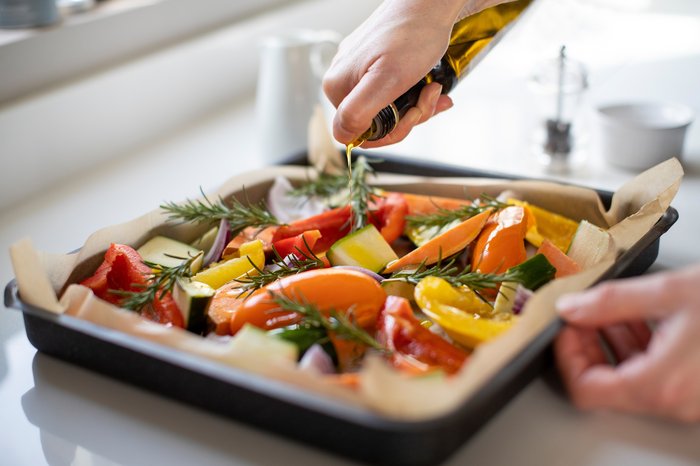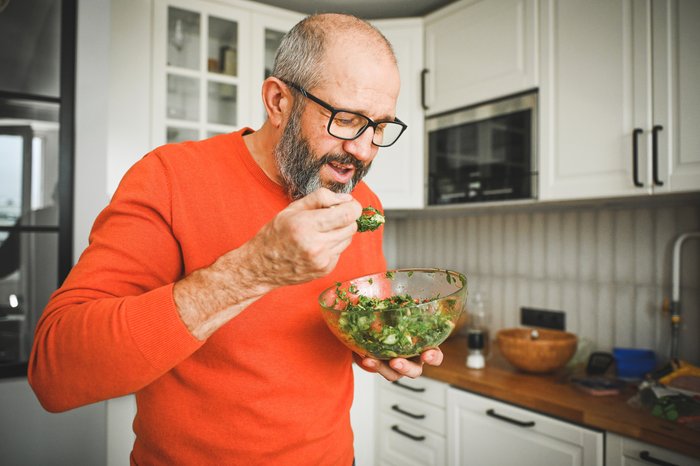There are no specific ‘kidney-friendly’ foods, although lots of online information will suggest that there are. Research shows that cutting down on ultra-processed foods and eating a diet high in fruit, vegetables, pulses, nuts, seeds and wholegrains can help support kidney health.
A healthy balanced diet can help kidney health by:
Managing blood pressure. High blood pressure is a common complication of kidney disease and can further damage the kidneys. A diet low in salt and rich in fibre and potassium from fruits, vegetables, wholegrains, nuts, seeds and pulses, helps to lower blood pressure and reduce the risk of complications. In the early stages of kidney disease, potassium is good for your kidneys. You should only restrict potassiumrich foods if a health professional advises you to do so.
Controlling blood sugar levels. If you have diabetes, managing your blood sugar levels may help to protect your kidneys from further damage. Choose foods that are high in fibre and limit sugary snacks and drinks to help stabilise your blood sugar levels.
Promoting heart health. People with kidney disease often also have heart and blood vessel disease. A heart-healthy diet that limits saturated fats and includes lots of protective fruit and vegetables helps reduce the risk.
Reducing the kidneys’ workload. Eating fewer ultra-processed foods is best for kidney health because very large amounts of certain food additives can harm the kidneys. Ultra-processed foods also tend to be high in salt, unhealthy fats and sugars.
What foods can I eat if I have CKD?
A diet which helps your kidneys is not different to a healthy diet.
The Eatwell Guide shows a healthy balanced diet. You do not need to achieve this balance with every meal but try to get the balance right each day or over a week.

Fruit and vegetables
Include a variety of colourful fruits and vegetables in your meals. These foods are rich in vitamins, minerals, and dietary fibre, which are needed for overall health and wellbeing.
Wholegrains and starchy foods
- Choose wholegrains such as brown rice, quinoa, oats, barley, and wholewheat bread instead of refined (white) varieties. Wholegrains provide fibre, vitamins, minerals, and complex carbohydrates, which help maintain energy levels and good digestive health.
- Potatoes are a good source of energy, fibre, vitamins, and minerals, particularly when eaten with their skins. Choose healthier cooking methods such as baking, boiling, or steaming, rather than frying.
Lean proteins
- Include beans, lentils, chickpeas, and other legumes in your diet regularly. Legumes are excellent sources of protein, fibre, vitamins and minerals.
- Also include a variety of plain, unsalted nuts and seeds, such as almonds, walnuts, chia seeds, flaxseeds, and pumpkin seeds. These foods are rich in healthy fats, protein, fibre, vitamins and minerals. They also provide essential nutrients for heart health and overall wellbeing
- Include lean meats like chicken and turkey, fish such as salmon, mackerel, and trout, and eggs.
- Eat red meat (beef, lamb and pork) and processed meats in moderation. Processed meats are those that have been preserved through smoking, curing, or salting, for example, bacon, sausage and deli meats
Dairy or dairy alternatives
Including some dairy or dairy alternatives in your diet supports bone health. Where possible, choose low fat and reduced sugar options.
Healthy fats
Healthy fats include sources of healthy fats, such as avocados, olives, nuts, seeds, and cold-pressed oils like olive oil and avocado oil, in your diet. These are good for heart health.
Minimally processed foods
Choose minimally processed foods over ultra-processed foods whenever possible. Minimally processed foods keep more of their natural nutrients and are generally lower in added sugars, unhealthy fats, salt, and additives.
Drinks
Stay hydrated by drinking enough throughout the day. Limit sugary drinks, fizzy drinks, fruit juice and excessive caffeine. Some people with kidney problems will be advised to control the amount of fluid that they drink. Always check with your kidney team before you follow this advice to make sure it applies to you.
Will I need a special diet for my kidneys?
Sometimes, changes to your diet are needed if your kidney disease progresses and your kidney function declines. Your healthcare team will check your kidney function, nutritional status and overall health to see if and when you need to make any special changes to your diet. A registered dietitian, specialising in kidney disease, will support you with any changes that are needed to ensure you can still enjoy your food and eat a healthy diet.
Please note, not everyone with kidney disease needs a special diet. The best thing you can do for your kidneys is to eat a healthy diet.
I have diabetes. Do I need a special diet for my diabetes and a different diet for my kidney disease?
Despite what you may read online or in books, we know that the healthy diet described in this leaflet manages both kidney disease and diabetes.
Rather than a rigid ‘renal’ (kidney) or ‘diabetes’ diet, if you are living with CKD and diabetes you will benefit from a healthy diet full of nutrient-rich foods such as fruits, vegetables, wholegrains and lean proteins. Limiting salt is also helpful. These healthy eating patterns will help both your CKD and diabetes and promote overall wellbeing.

How can I reduce the amount of salt in my diet?
Too much salt can lead to high blood pressure and fluid retention, which can affect your kidney function and increase the risk of complications.
To help you eat less salt:
Cook at home
Prepare meals at home using fresh ingredients. When cooking, use as little salt as possible or no salt at all.
Use herbs and spices
Flavour your meals with herbs, spices, and natural seasonings to enhance the taste of your dishes without adding extra salt.
Avoid adding salt at the table
Get into the habit of tasting your food before adding salt at the table. You may find that you don’t need as much salt as you thought once you start paying attention to the natural flavours of foods.
Cut down on processed foods
Limit processed and packaged foods, such as canned soups, ready meals, processed meats (hams, salami, cured meats, corned beef), and snack foods (crisps). Processed foods often contain high amounts of salt.
Limit condiments and sauces
Condiments like soy sauce, ketchup, barbecue sauce, and salad dressings can be high in salt. Use them in small amounts. You can also make your own sauces and dressings using fresh ingredients.
Check for hidden sources of salt.
Be aware that salt can hide in unexpected places, such as pickled foods, processed cheese, bakery goods and even some breakfast cereals. Check labels carefully and choose lower salt alternatives.
The following table is based on the traffic light food labelling system and can be used as a guide to healthier food choices.
| Low | Medium | High |
|---|---|---|
| 0.3g or less salt per 100g | Between 0.3g and 1.5g salt per 100g | Over 1.5g salt per 100g |
| A good healthier choice | An okay choice | Eat occasionally or as a treat |
Some food labels show the salt content per portion size of food. Remember that you may eat more or less than the suggested portion size. It is also important to consider the overall salt content of your meal.

How can I manage my weight with kidney disease?
Maintaining a healthy weight is good for your kidney health. Being more active and adopting a healthy, balanced diet that is lower in calories can help you lose weight. Losing even a small amount of weight can help with:
Blood pressure management
Excess weight can contribute to high blood pressure. High blood pressure further damages the kidneys and can speed up the progression of kidney disease. Achieving and maintaining a healthy weight can help lower blood pressure and reduce the risk of complications.
Diabetes management
Obesity is a risk factor for type 2 diabetes, which is a leading cause of kidney disease. For people with both CKD and diabetes, maintaining a healthy weight helps to control blood sugar levels and may prevent further kidney damage.
Heart health
Being overweight is linked with an increased risk of cardiovascular disease. Maintaining a healthy weight reduces the risk of heart disease, stroke, and other cardiovascular complications commonly linked to kidney disease.
Body Mass Index (BMI) is a measurement that works out if you have a healthy weight by using your height and the amount you weigh.
What else can I do to stay healthy?
Move as much as you can
Being active and moving more helps to keep your body healthy and strong. Being active can help you to manage your weight and help to lower your blood pressure. It is also great for increasing your selfconfidence. Physical activity can take many forms. Try to find one that you can do, that fits into your lifestyle and that you enjoy. Speak to your healthcare team before becoming more physically active to make sure that it is suitable for your individual health situation. See our page on exercise and being active for more information.

Stop smoking
Smoking is harmful to kidney health. It damages blood vessels, leading to reduced blood flow to the kidneys, which can affect their function over time. Smoking also increases the risk of high blood pressure and diabetes. Talk to your GP for advice on how to stop and to be referred to specialist support.
Check your medications
Some medicines can be harmful to people with kidney disease. Tell your kidney team about any medicines that you are taking, even if they are not related to your kidney disease. This includes over the counter medicines, herbal remedies or supplements that you buy yourself from a chemist or health food shop.
Check your blood pressure regularly
Your kidney team can teach you how to do this yourself at home.
Should I take vitamins, minerals and other supplements or remedies?
Always speak to your healthcare team before you take any vitamins, supplements and herbal remedies. Herbal remedies and dietary supplements are not regulated in the same way as prescription medications, and some may contain ingredients that can be harmful to the kidneys or interact with your medications.
Can I still drink alcohol?
The advice for people with kidney disease is the same as for the general population. If you decide to drink alcohol, the UK guidance is for both men and women to drink no more than 14 units of alcohol per week. One unit is the same as ½ pint of beer or lager, one small glass of wine, or one pub measure of spirits. Remember that drinks that you pour for yourself may be larger than a pub measure.
Your alcohol intake should be spread over at least three days in the week and include some alcohol-free days. UK guidance is based on evidence that shows any amount of alcohol consumption carries health risks.
Check with your doctor if it is safe for you to drink alcohol, particularly if you are taking any medications.
Where can I find out more information?
Please speak to your kidney dietitian for individual dietary advice, and for information about your specific dietary requirements.
- Kidney Kitchen - Healthy, delicious multicultural food for every stage of kidney disease. Approved by kidney dietitians and enjoyed by everyone.
- NHS Choices - Live Well

Publication date: 12/2024
Review date: 12/2027